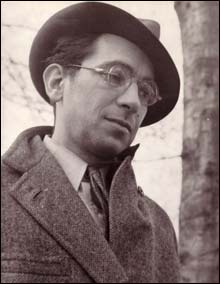
WHAT’S IN A NAME? In Fearing’s portrait of corporate corruption, paranoia is a sensible determination to watch your back.
|
It would be comforting to put the cynicism in The Big Clock down to post-war disillusionment. Except that nothing in the voice achieved by the author, Kenneth Fearing, suggests that he ever had any illusions to be dispelled. The rot of public and private life in this 1946 book is so pervasive that it feels less an aberration than a realization. This, Fearing is saying, is what American success consists of: mediocrity, corruption, ruthlessness that’s so second nature it’s business as usual, paranoia that’s actually a sensible determination to watch your back.
There’s nothing cheap or easy about Fearing’s cynicism. His vision of corporate corruption is vivid and convincing. Perhaps because he wrote his share of pulp, and because The Big Clock was made into a 1948 film noir, it’s long been pegged as a genre novel. (It was also the basis for the 1987 No Way Out with Kevin Costner, but don’t hold that against it.) In fact, Fearing follows the rules of genre writing only intermittently, and then largely to bend them to his perverse will.
There’s a crime in The Big Clock, but no mystery. Earl Janoth, the head of a magazine-publishing empire that bears his name, bludgeons his mistress after seeing her with another man. Suspecting the mystery escort might have seen him, Janoth sets his henchman, Hagen, to discover the man’s identity and kill him. Hagen assigns the uncovering of the man’s identity to George Stroud, the editor of the Janoth Company’s Crimeways magazine. What neither Janoth nor Hagen knows is that Stroud was the dead woman’s date, and he’s figured out that Janoth is the killer.

|
The suspense comes from Stroud’s managing of the investigation to keep from being found out. The perversity here is in why he fears discovery: not because he fears losing his life but because he fears losing his position. Time and again when he’s on the verge of being found out, I had to remind myself that he isn’t the killer. But going to the police, revealing his infidelity (he’s married and a serial philanderer), ratting out his boss — that would be suicide in the corporate world. So, faced with knowledge of the murder of a woman he’s slept with, he thinks only of his own skin.
Fearing — was ever a writer better named? — was a poet, a contributor to the New Yorker, a founder of Partisan Review, and dead of alcoholism before his 60th birthday in 1961. Somewhere he must be cackling. His vision of corporate corruption, in which business, journalism, the arts, and politics have all mingled in what the whores who’ve taken over American journalism call “synergy,” is now more prescient than ever. Here is Stroud describing the guests at a see-and-be-seen Janoth cocktail party: “A sizable sprinkling of lunatics, so plausible they had never been suspected and never would be. Memorable bankrupts of the future, the obscure suicides of ten or twenty years from now. Potentially fabulous murderers.” Elsewhere we find one of those editors who gain a reputation as having impeccable smarts and taste largely because they have no ideas of their own — they only know what they don’t want. And Fearing nails the pretensions of one of Stroud’s colleagues by having him take War and Peace — “which I was rereading,” he says — on a stakeout. Presiding over it all, trying to master the company that’s swallowing even the man it’s named for, is George Stroud. He is, as Paul Schrader once said of the Ralph Meeker character in Kiss Me Deadly, a dwarf among midgets. In The Big Clock that makes him the tallest man in the room — and the last man standing.
ADVERTISEMENT
 |
The Big Clock | By Kenneth Fearing | New York Review of Books Classics, 206 pages, $14